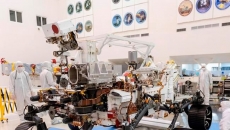WASHINGTON - For a platform that once only allowed sentences as long as this one, the teeter-totter fate of Twitter sure is consuming a lot of oxygen.
And new owner Elon Musk is rapidly earning a reputation to rival that of Twitter's most infamous bomb-thrower: former president Donald Trump.
"You just took the words right out of my mouth," said Philip Napoli, an expert on media and democracy at Duke University in Durham, N.C.
The $44-billion shotgun wedding between an ambitious man with an outsized appetite for public attention and one of the world's most powerful social media tools is already proving a potent combination, Napoli said.
"When you take that ego and you put a platform in their hands, you realize there was actually still an untapped well of narcissism there that was not being expressed. And I think that's what we're watching transpire here."
Twitter added 1.6M daily active users this past week, another all-time high pic.twitter.com/Si3cRYnvyD
— Elon Musk (@elonmusk) November 22, 2022
Musk, who had said he would establish a "content moderation council" that would handle issues such as standards and reinstating banned accounts, appeared to have abandoned that strategy over the weekend.
He left it up to Twitter users themselves to resolve the question of whether to allow Trump — permanently banned in the aftermath of the Capitol Hill riots on Jan. 6, 2021 — to return to the service.
Just 24 hours after a Twitter poll generated more than 15 million votes, he had his answer: 51.8 per cent of respondents supported bringing back the former president. "The people have spoken," Musk tweeted.
Trump, however, is another matter. He's vowed to stay on his own bespoke service, Truth Social, leaving his now-visible Twitter feed as a haunting time capsule from one of the most turbulent periods in modern U.S. political history.
"To all of those who have asked," Trump's last tweet reads, "I will not be going to the inauguration on Jan. 20."
Meanwhile, Musk's first month has been a cavalcade of deep job cuts and disaffected defections — both from the workplace and the service itself — as users fear the advent of an era of extremist polemics, Twitter's eventual collapse or both.
His own flurry of tweets, mostly a miscellany of racy, sarcastic memes, ruminations and defiant proclamations that the service is healthy and growing, appear designed primarily to attract eyeballs.
"New Twitter policy is freedom of speech, but not freedom of reach," he declared last week, describing a system that would make "negative/hate tweets" harder to see and ensure they don't generate revenue.
"I think we are seeing a sickness here that may be even worse in some respects than what we've seen over the last several years," tweeted longtime Trump critic George Conway, whose wife Kellyanne is a former adviser to the ex-president.
"I think we're pretty much done here. See you elsewhere."
Conway has since migrated to a fledgling replacement, Post.news, as have a host of some of Twitter's most prolific users, many of them journalists, academics and political activists.
Others have embraced Mastodon, an open-source alternative designed to decentralize the social-network experience, which Napoli said already appears to be groaning under the weight of an explosion of new users.
Neither, it appears, is in any position to displace Twitter as a powerful force in U.S. politics and a key weapon in the ongoing culture wars south of the border, said Napoli, who described himself as taking a wait-and-see approach.
But there's an inherent danger in a service as prominent as Twitter becoming a repository for extremist ideas, especially as more moderate voices decide to abandon it, he added.
"As it transforms into something far more toxic than what it has been, there will be some people — and we know this from the history of social media so far — who will be victimized by that, who will get caught up, who will get radicalized," Napoli said.
"All those things, all those processes can operate even even more freely among that relatively small part of the population that is sticking around and letting themselves be exposed."
Not that there aren't already plenty of options available for those on the right-wing side of the U.S. political spectrum. Several have cropped up in recent years, including Gab, Gettr and Trump's own network.
That fracturing of the social media landscape appears to be following a similar path to the one that led to mainstream media outlets in the U.S. picking political sides, said Jason Miller, a former Trump spokesman who now serves as Gettr's CEO.
"The separation has already happened, where you have two separate ecosystems," Miller told a panel hosted by Semaphor, an online news startup co-founded by former BuzzFeed editor-in-chief Ben Smith.
Ultimately, decentralization — whether it's in the traditional media landscape or on social media, which is currently dominated by big tech players — is a good thing, Miller continued.
"The way that you could have ... a couple of media outlets or a couple of social media outlets pick what stories are going to be covered or not, I think is bad for democracy," he said.
"I think decentralization giving people more options when it comes to free speech is a good thing."
As for Twitter's future, Miller is noncommittal, even if he is fatalistic.
"I think if Musk was putting his focus on the innovation side, there might be a chance, but I think the brand might be just too badly damaged."





